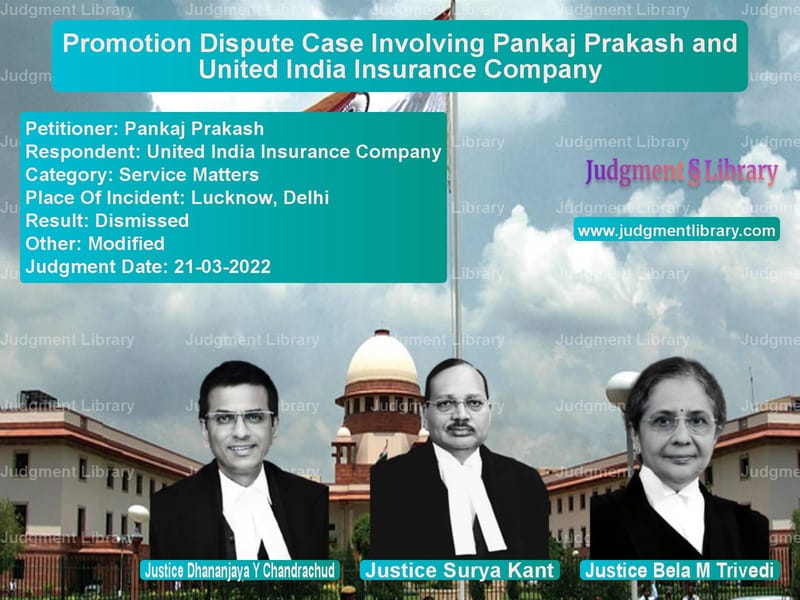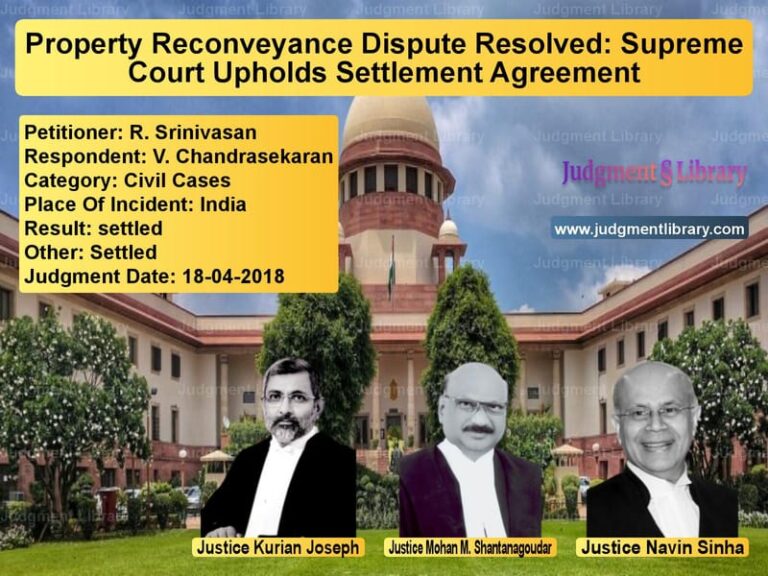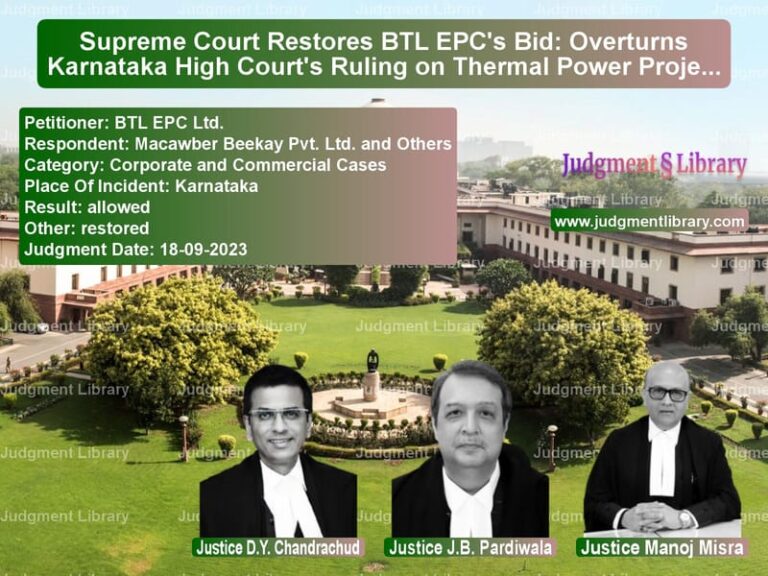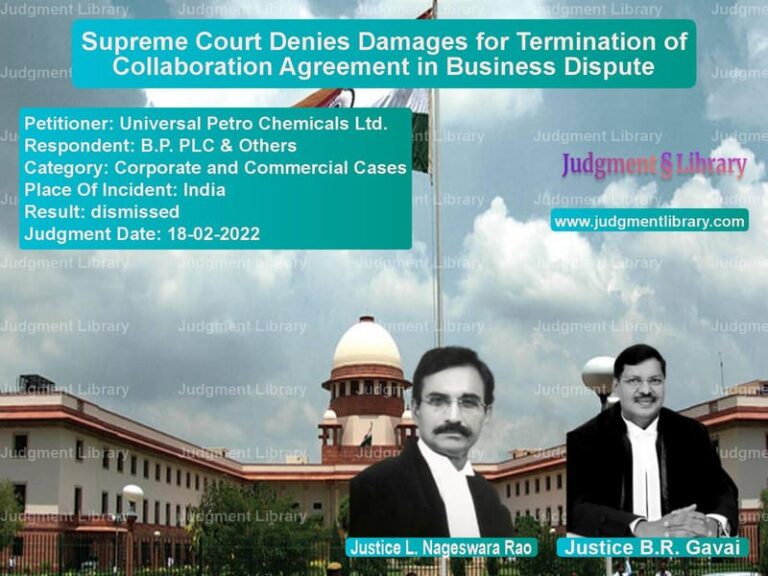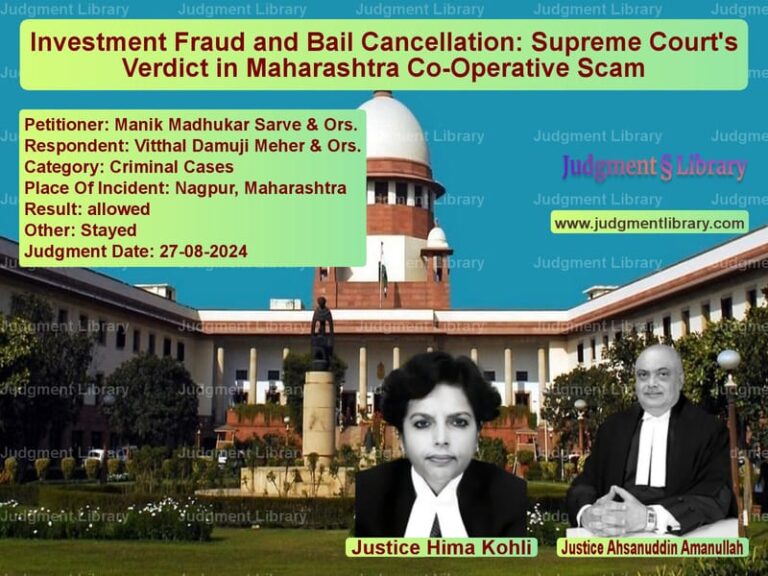Promotion Dispute Case Involving Pankaj Prakash and United India Insurance Company
The case at hand deals with a dispute regarding the non-promotion of Pankaj Prakash, an employee at United India Insurance Company, from the position of Deputy Manager in Scale III to Manager in Scale IV. The promotion was to have occurred in 2015 and 2016. Pankaj Prakash had been consistently working in the company for several years and believed that he met all the required criteria for promotion. However, his promotion was denied, and this led to the filing of a series of legal petitions and the eventual appeal to the Supreme Court of India. The dispute, involving an alleged violation of promotion policies and procedures, has traversed through multiple legal forums, and the issues presented have drawn attention to the interpretation of administrative rules and judicial oversight in such matters.
The appellant, Pankaj Prakash, claims that despite his qualifications and seniority, he was unfairly passed over for promotion, while juniors were promoted to managerial positions in the same period. He argues that the Insurance Company failed to adhere to the promotion policies of 2006, which should have been followed during the promotion exercise. The appellant had consistently been performing his duties with diligence and expected that his hard work would be recognized and rewarded through promotion. The primary grounds of his grievance revolve around the procedural issues in his promotion process, including the non-communication of his Annual Performance Appraisal Reports (APAR) for the years 2010-2012.
The matter initially came before the Allahabad High Court, where Pankaj Prakash filed a writ petition seeking to challenge the decision. However, the High Court dismissed the petition, stating that no actionable evidence had been presented to substantiate the claim of wrongful denial of promotion. The appellant’s subsequent attempt to review the High Court’s decision was also rejected. This set the stage for a broader legal battle that ultimately reached the Supreme Court of India.
Read also: https://judgmentlibrary.com/supreme-court-partially-allows-maharashtra-employees-pay-scale-dispute/
In its judgment dated 10th July 2019, the Supreme Court addressed the issue of non-communication of the APAR entries for the relevant years. In this case, the Court ruled that the failure to communicate the entries was a violation of the appellant’s rights and in contravention of earlier precedents set in the cases of Dev Dutt vs Union of India and Sukhdev Singh vs Union of India. These landmark rulings had established the legal precedent that employees must be provided with access to their performance appraisals and the right to challenge those assessments if necessary. The Court found that denying Pankaj Prakash access to his APAR entries violated his right to procedural fairness, which is guaranteed under the principles of natural justice.
The Supreme Court’s ruling in July 2019 directed the Insurance Company to communicate the uncommunicated APAR entries to the appellant within a specified time frame. This was intended to provide the appellant with an opportunity to raise objections and submit representations, which the competent authority was required to consider before making a decision on the appellant’s promotion for the 2014-15 period. The Court further directed that the representations made by the appellant should be reviewed by a senior authority to avoid any potential bias in the decision-making process.
Despite the Supreme Court’s order, the appellant’s representation was not accepted by the respondent, United India Insurance Company. This refusal led to further legal proceedings, with the appellant filing a fresh petition before the Delhi High Court in 2021. The petition was intended to challenge the Insurance Company’s decision to disregard the appellant’s representation, which had not been considered in the manner prescribed by the Court’s previous order. This petition was still pending at the time of the appeal to the Supreme Court in 2022.
The current appeal arose from the appellant’s grievance regarding his non-promotion for the years 2015 and 2016. There was an element of overlap between the non-promotion of the appellant in 2014 and the promotion issues concerning the following years, as the promotion for the subsequent years was also based on the same APARs and related performance records. The High Court had referred to the appellant’s earlier grievance for 2014 and dismissed the current appeal on the grounds that the earlier decision had attained finality and could not be challenged further. The appellant’s argument that his promotion for 2015 and 2016 should be reconsidered was dismissed as well.
The Supreme Court, however, disagreed with the High Court’s conclusion. The Court acknowledged that the judgment for 2014, while it had become final, could not be considered in isolation. Given the interconnection between the 2014 issue and the appellant’s claims for 2015 and 2016, the Court determined that it was essential to address all of these matters together in a fair and consistent manner. The Supreme Court observed that the promotion policy of the Insurance Company, as laid out in the 2006 guidelines, relied on four key criteria: (i) written test, (ii) work record, (iii) seniority, and (iv) interview. Since the APARs, which reflect the work record, constitute a reckonable parameter in the promotion exercise, the grievance of the appellant pertaining to the year 2014, following the earlier decision of this Court, was still pertinent to the current case.
In view of these factors, the Supreme Court set aside the judgment of the Allahabad High Court, which had dismissed the appellant’s claim for promotion for the years 2015 and 2016. The Court decided to transfer the appellant’s writ petition to the Delhi High Court, where it could be heard and decided in conjunction with the petition that was already pending regarding the 2014 promotion issue. The Court emphasized that the transfer of the case would ensure that both matters were dealt with expeditiously and in a coherent manner, considering the overlap between the two cases.
The Supreme Court’s decision in this case is significant because it reaffirms the importance of adhering to procedural fairness in promotion cases within public sector organizations. It underscores the principle that employees must be given a fair opportunity to contest decisions that affect their career progression, particularly when performance appraisals are central to those decisions. By directing the transfer of the case to the Delhi High Court, the Supreme Court sought to ensure that the appellant’s grievances were heard and adjudicated in a fair and impartial manner.
The Court also highlighted that the setting aside of the High Court’s judgment was not an expression of opinion on the merits of the appellant’s claim regarding his non-promotion for 2015 and 2016. Instead, the decision was based purely on procedural considerations, with the intent of ensuring that both the 2014 and 2015-2016 promotion issues were resolved together in a fair manner. The decision of the Delhi High Court on these issues will ultimately determine the appellant’s fate and whether he is entitled to the promotion he claims.
As this case moves forward, it serves as an important reminder of the need for transparency, fairness, and adherence to due process in the management of promotions and personnel matters within public sector organizations. The outcome of the proceedings before the Delhi High Court will not only affect the appellant but will also have broader implications for the interpretation and application of promotion policies in similar cases.
In conclusion, while the appellant’s journey has been long and complex, the Supreme Court’s intervention in this case has provided a much-needed opportunity for the appellant to have his grievances heard and adjudicated in a fair manner. The transfer of the case to the Delhi High Court will ensure that all issues are considered together, and the appellant’s claim for promotion will be evaluated on its merits in light of the relevant legal principles. The outcome of this case will likely have lasting consequences for how promotion disputes are handled in public sector organizations.
Petitioner Name: Pankaj Prakash.Respondent Name: United India Insurance Company.Judgment By: Justice Dhananjaya Y Chandrachud, Justice Surya Kant, Justice Bela M Trivedi.Place Of Incident: Lucknow, Delhi.Judgment Date: 21-03-2022.
Don’t miss out on the full details! Download the complete judgment in PDF format below and gain valuable insights instantly!
Download Judgment: pankaj-prakash-vs-united-india-insuran-supreme-court-of-india-judgment-dated-21-03-2022.pdf
Directly Download Judgment: Directly download this Judgment
See all petitions in Promotion Cases
See all petitions in Employment Disputes
See all petitions in Public Sector Employees
See all petitions in Disciplinary Proceedings
See all petitions in Termination Cases
See all petitions in Judgment by Dhananjaya Y Chandrachud
See all petitions in Judgment by Surya Kant
See all petitions in Judgment by Bela M. Trivedi
See all petitions in dismissed
See all petitions in Modified
See all petitions in supreme court of India judgments March 2022
See all petitions in 2022 judgments
See all posts in Service Matters Category
See all allowed petitions in Service Matters Category
See all Dismissed petitions in Service Matters Category
See all partially allowed petitions in Service Matters Category

